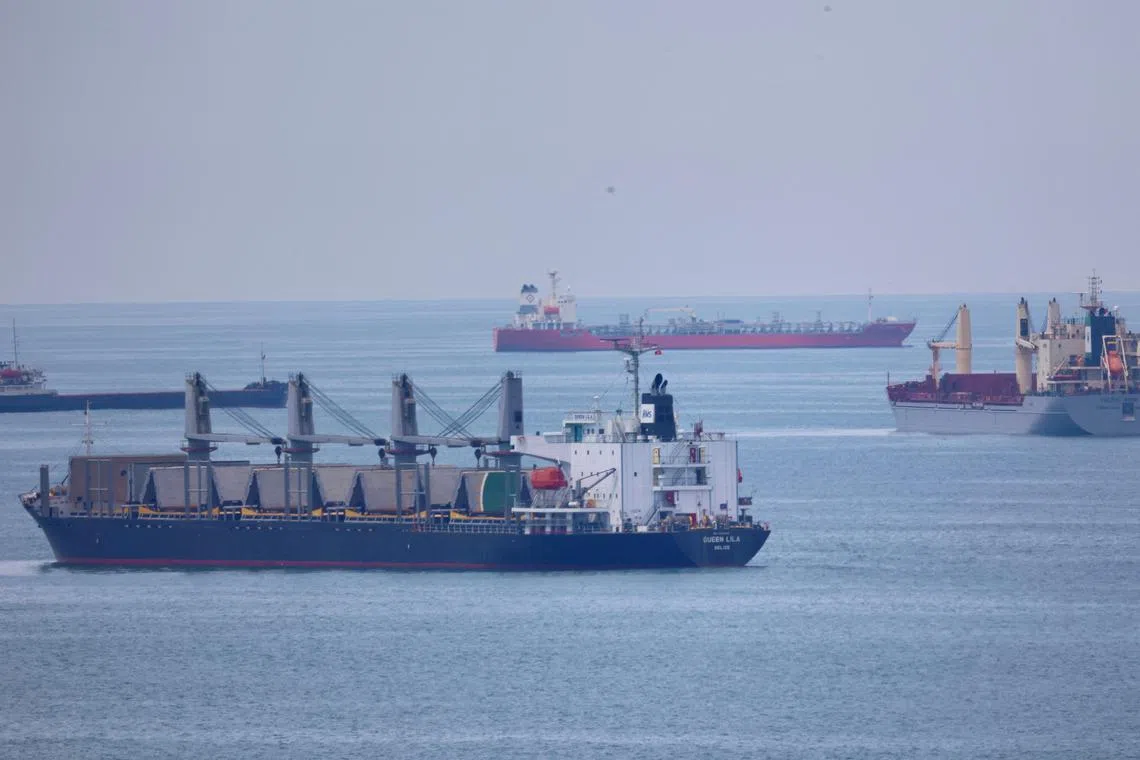Ukraine grain export deal extended for two more months
Sign up now: Get ST's newsletters delivered to your inbox

A vessel carrying corn under the Black Sea grain deal waiting for inspection in the northern anchorage of Istanbul, Turkey, on May 14.
PHOTO: REUTERS
ISTANBUL - The Ukraine Black Sea grain deal has been extended for two more months, Turkish President Recep Tayyip Erdogan said on Wednesday, one day before Russia could have quit the pact over obstacles to its grain and fertiliser exports.
“With the efforts of our country, the support of our Russian friends, the contribution of our Ukrainian friends, it was decided to prolong the Black Sea grain deal for two more months,” he announced.
Russia agreed not to block ships from leaving two Ukrainian harbours, Mr Erdogan said, expressing his hope that the deal would be “beneficial for all the parties”.
He thanked Russian President Vladimir Putin, Ukrainian President Volodymyr Zelensky and United Nations Secretary-General Antonio Guterres for their roles in extending the agreement.
Mr Erdogan’s comments, made in a televised speech to officials of his ruling AK Party, came after the last ship left a Ukrainian port under the deal, which allows for the safe export of Ukrainian grain via the Black Sea and was due to expire on Thursday.
Ukraine said it was grateful to Turkey and the UN for the deal’s extension.
But a senior Ukrainian official said Russia must not be allowed to sabotage the agreement and must stop using food “as a weapon and blackmail”.
“We welcome the continuation of the initiative, but emphasise that it must work effectively,” Deputy Prime Minister Oleksandr Kubrakov said on Facebook.
Russia confirmed reports on Wednesday that the Black Sea grain deal had been extended for 60 days.
Foreign Ministry spokesman Maria Zakharova said the deal had been extended to help countries in need, but added that Russia’s overall assessment of the situation regarding the deal “has not changed”, calling for “distortions” in the deal to be “corrected as quickly as possible”.
The flow of ships through the corridor had been grinding to a halt in the last few days, with the deal apparently set to expire on Thursday.
The UN and Turkey brokered the Black Sea deal for an initial 120 days last July to help tackle a global food crisis that has been aggravated by Moscow’s invasion of Ukraine, one of the world’s leading grain exporters.
Moscow agreed to extend the Black Sea pact for a further 120 days in November, but then in March it agreed to just a 60-day extension – until Thursday – unless a list of demands regarding its own agricultural exports was met.
To convince Russia last July to allow Black Sea grain exports, the UN had agreed at the same time to help Moscow with its own agricultural shipments for three years.
Turkey, Ukraine, Russia and the UN had been holding talks on ways to extend the deal
The last ship to depart before the extension, DSM Capella, left the Ukrainian port of Chornomorsk on Wednesday, carrying 30,000 tonnes of corn, and was on its way to Turkey, according to the UN.
Ukraine’s corn crop is forecast to total just 21 million tonnes this year, around half of the 42.1 million it harvested two years before the conflict began, according to the International Grains Council.
Moscow has threatened to quit the deal over obstacles to its grain and fertiliser exports.
While Russian exports of food and fertiliser are not subject to Western sanctions imposed following the February 2022 invasion of Ukraine, Moscow says restrictions on payments, logistics and insurance have amounted to a barrier to shipments.
The United States has rejected Russia’s complaints.
US Ambassador to the UN Linda Thomas-Greenfield said of Russia last week: “It is exporting grain and fertiliser at the same levels, if not higher than before the full-scale invasion.”
Officials from Russia, Ukraine, Turkey and the UN make up a Joint Coordination Centre (JCC) in Istanbul, which implements the Black Sea export deal. They authorise and inspect ships. No new vessels have been authorised by the JCC since May 4.
Authorised ships are inspected by JCC officials near Turkey before travelling to a Ukrainian Black Sea port via a maritime humanitarian corridor to collect their cargo and return to Turkish waters for a final inspection.
In an excerpt of a letter seen in April, Russia told its JCC counterparts that it will not approve any new vessels taking part in the Black Sea deal unless the transiting is done by May 18, “the expected date of... closure”.
It said this was “to avoid commercial losses and prevent possible safety risks” after May 18.
Given this warning by Russia, it appears unlikely that any shipowners or insurance companies would be willing to continue transporting Ukrainian grain exports if Moscow does not agree to an extension of the deal and decides to quit.
Some 30.3 million tonnes of grain and foodstuffs have been exported from Ukraine under the Black Sea deal, including 625,000 tonnes on World Food Programme vessels for aid operations in Afghanistan, Ethiopia, Kenya, Somalia and Yemen. REUTERS


